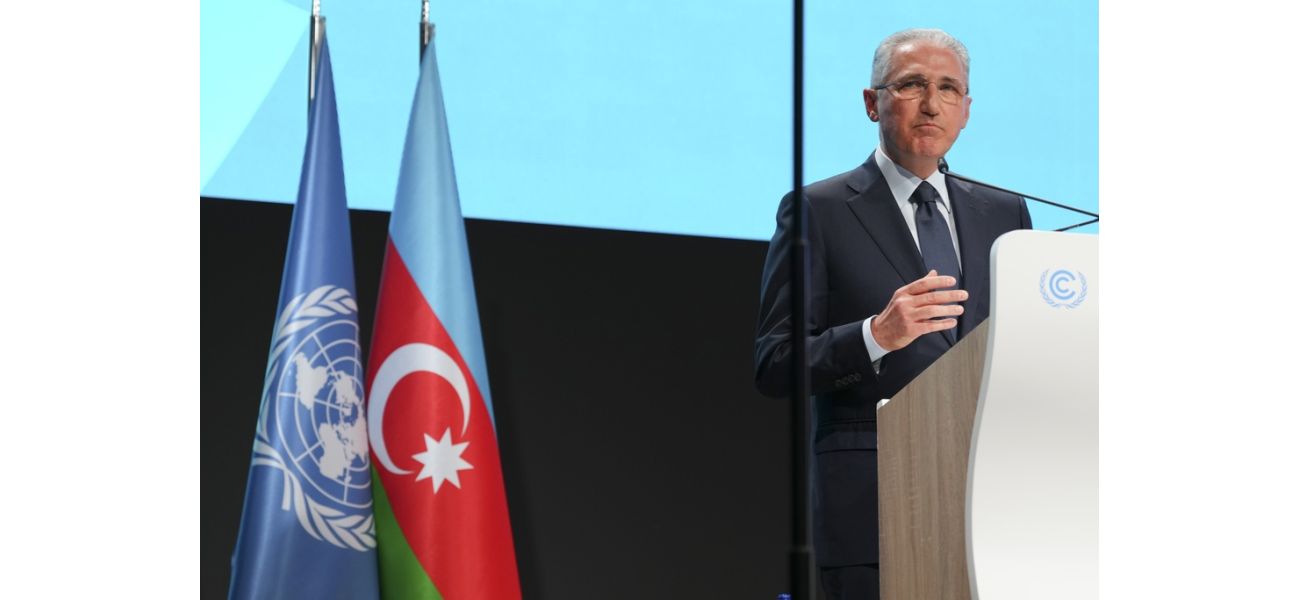Climate discussions emphasize dangers, but key issue is financial resources.
Despite turbulent times, there have been inspiring speeches and promises of collaboration amidst political shifts, wars, and financial struggles.
November 11th 2024.

As the United Nations annual climate talks, known as COP29, begin, the sense of urgency is palpable. Against a backdrop of political upheaval, global conflicts, and economic struggles, world leaders have gathered in Baku, Azerbaijan to address the pressing issue of climate change. The world's first oil well, drilled in Baku, serves as a stark reminder of the fossil fuel-driven economy that has led to the current climate crisis.
The main focus of this year's talks is to reach a new agreement on the flow of financial aid from developed nations to developing ones. This money is intended to help the latter transition away from fossil fuels, mitigate the impact of climate disasters, and adapt to future extreme weather events. The new president of COP29, Mukhtar Babayev, stressed the importance of this financial support, stating that the cost of inaction far outweighs the cost of taking action.
The Paris Agreement, signed in 2015, set a goal of limiting global warming to 1.5 degrees since pre-industrial times. However, we are currently on track for 1.5 degrees of warming, and this year is on pace to become the hottest on record. Despite this, World Meteorological Organisation Secretary-General Celeste Saulo emphasized that abandoning this goal is not an option. Signs of climate disasters are already evident, and the impacts are being felt by communities around the world.
The effects of climate change are not limited to natural disasters, as highlighted by United Nations Climate Secretary Simon Stiell. He shared the story of his 85-year-old neighbor, Florence, whose home was destroyed by Hurricane Beryl earlier this year. Despite her own struggles, Florence remained strong for her family and community. Stiell emphasized the need for nations to come together and provide financial support, stating that it is in everyone's self-interest to do so.
However, the talks are not without their challenges. The past year has seen significant political upheaval, with the election of leaders who deny the existence of climate change. This has altered the dynamics of the negotiations, making it more challenging to reach a consensus. Additionally, the ongoing wars in various parts of the world serve as a sobering reminder of the consequences of inaction.
Amidst the chaos, climate activists from around the world have gathered at the conference to demand action and justice. They call for an end to the systems of oppression and discrimination that perpetuate both climate change and conflict. As one activist put it, "We are not citizens of one nation, we are citizens of the Earth."
Despite the challenges, there is still hope for a strong outcome. The financial package being discussed at the talks is crucial for nations to meet their targets for reducing emissions. The current trajectory of global temperature rise is dangerously close to the agreed-upon threshold, and urgent action is needed to prevent further warming. As Stiell stated, now is the time to show that global cooperation is not down for the count, but rising to the moment.
The main focus of this year's talks is to reach a new agreement on the flow of financial aid from developed nations to developing ones. This money is intended to help the latter transition away from fossil fuels, mitigate the impact of climate disasters, and adapt to future extreme weather events. The new president of COP29, Mukhtar Babayev, stressed the importance of this financial support, stating that the cost of inaction far outweighs the cost of taking action.
The Paris Agreement, signed in 2015, set a goal of limiting global warming to 1.5 degrees since pre-industrial times. However, we are currently on track for 1.5 degrees of warming, and this year is on pace to become the hottest on record. Despite this, World Meteorological Organisation Secretary-General Celeste Saulo emphasized that abandoning this goal is not an option. Signs of climate disasters are already evident, and the impacts are being felt by communities around the world.
The effects of climate change are not limited to natural disasters, as highlighted by United Nations Climate Secretary Simon Stiell. He shared the story of his 85-year-old neighbor, Florence, whose home was destroyed by Hurricane Beryl earlier this year. Despite her own struggles, Florence remained strong for her family and community. Stiell emphasized the need for nations to come together and provide financial support, stating that it is in everyone's self-interest to do so.
However, the talks are not without their challenges. The past year has seen significant political upheaval, with the election of leaders who deny the existence of climate change. This has altered the dynamics of the negotiations, making it more challenging to reach a consensus. Additionally, the ongoing wars in various parts of the world serve as a sobering reminder of the consequences of inaction.
Amidst the chaos, climate activists from around the world have gathered at the conference to demand action and justice. They call for an end to the systems of oppression and discrimination that perpetuate both climate change and conflict. As one activist put it, "We are not citizens of one nation, we are citizens of the Earth."
Despite the challenges, there is still hope for a strong outcome. The financial package being discussed at the talks is crucial for nations to meet their targets for reducing emissions. The current trajectory of global temperature rise is dangerously close to the agreed-upon threshold, and urgent action is needed to prevent further warming. As Stiell stated, now is the time to show that global cooperation is not down for the count, but rising to the moment.
[This article has been trending online recently and has been generated with AI. Your feed is customized.]
[Generative AI is experimental.]
0
0
Submit Comment





